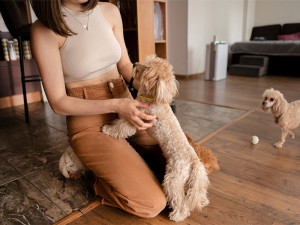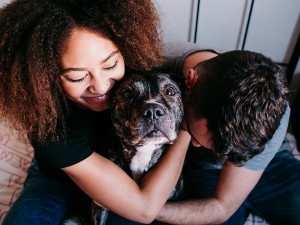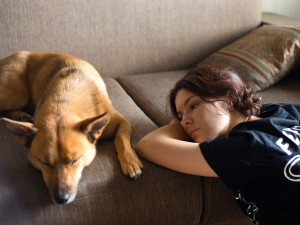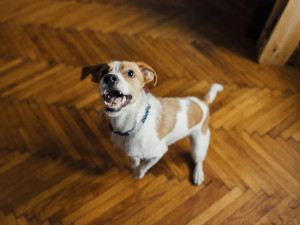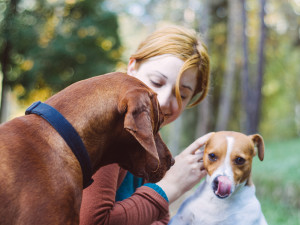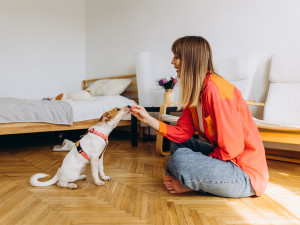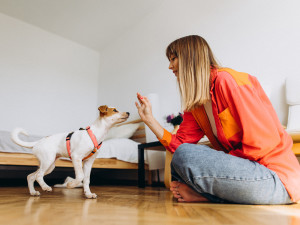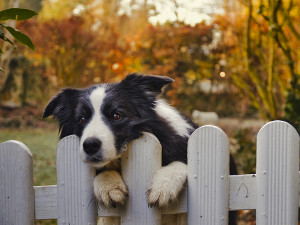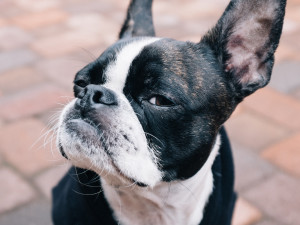
Share Article
In This Article:
7 Reasons Why Your Dog Sits on You 7 Signs Your Dog Has Imprinted On You Frequently Asked Questions
If your dog frequently sits on you, it’s natural to wonder why. While it may simply be a sign of affection and comfort-seeking, understanding your dog’s motivations can help you foster a healthy relationship and identify any potential concerns.
Research shows the love of a dog can change your life. Snuggling with your dog can even have health benefits and help decrease your levels of stress. Understanding why your dog wants to sit on your lap can help you understand them better, too.
7 reasons why your dog sits on you
Seeking comfort and security
Does your dog have any fears or anxiety? Depending on the relationship you have built with them, you may help them feel safe. Dogs have been known to seek comfort from their parents when scared or uncomfortable. If your dog is scared, it’s OK to help them feel comfortable by petting them and allowing them to sit on you.

Do you find your dog getting closer, looking at you with concern, or wanting to sit on you during a thunderstorm or fireworks or while at the vet? Your dog may be seeking a sense of safety and security. By consoling them, you will not make their fear worse. You can help them become more comfortable with whatever they are fearful of or uncomfortable with because they trust you.
Showing affection and boundaries
Bonding with your dog is important to help build a healthy relationship. Having a great bond with your dog will make them easier to train and more likely to respond to the cues they have been taught. Typically, dogs will cuddle or sit on other dogs with whom they have a bond or feel comfortable, and this goes the same for their humans.
Allowing your dog to sit on you and then cuddling them (if they enjoy that) is a great way to bond with them. When petting your dog, you want to pet them in a way they enjoy. Your dog may sit on you because they love you and enjoy your company. Size doesn’t matter; be sure to make room for your large lap dog or your miniature snuggle pup.
Warmth
Dogs like to get cozy, too. Depending on their size, the type of fur they have, or their breed, they may seek warmth or cuddles more than other dogs. Your Husky or Malamute may not enjoy cuddling or sitting on you because they get too warm. But Greyhound or Chihuahua may need the warmth of a jacket, blanket, or cuddle session to help keep them toasty and happy.
Who doesn’t love sitting by the fireplace or under your favorite blanket? Some dogs may enjoy that, too, paired with sitting on their favorite human.
Craving attention and interaction
Just like humans, dogs enjoy attention and interaction. Your dog may come over to sit on you when they are looking for attention or interaction. One way your dog may want to interact is by sitting on you during play, just like they might sit on one of their siblings. This is a great way to bond with your dog. Encouraging play can help build a stronger relationship with your dog. Find different ways that your dog enjoys playing, and engage with them in those ways.
Typically, wolves are known to be animals that stay together with other wolves; they are not usually independent animals. Dogs are the same; most dogs like the company of others, whether it be another dog or a human.
If your dog is home alone most of the day, they may crave your attention and want to interact when you get home. Dogs don’t have a way of telling us they want a hug, so they may come over and sit on you to show they want your attention, especially if your attention is focused elsewhere after a long day.
Spreading the scent
Dogs may rub on you and sit on you to mark you with their scent, which often represents affection. They may be doing this to show you affection and that they are bonded with you and trust you.
Learned behavior
Dogs can be creatures of habit, and they learn by repeating a behavior over and over. This is the same way you taught your dog to give a paw by being rewarded each time they completed the cue. Your dog can learn if they sit on you, they get what they want. Whether they want affection, play, or comfort, your dog may engage in this behavior because they have done it before and gotten their desired results.
Breed-specific tendencies
Some breeds are known to sit or lean on their humans. Bernese Mountain dogs are known for leaning on their parents, as well as anyone petting them. Being close to you brings a Bernese Mountain dog comfort. Vizslas are known to be extremely clingy dogs who love cuddling. Vizslas can suffer from separation anxiety if their needs are not met because this dog was bred to be with their parent at all times to participate in falconry.
It’s important to do your research before selecting a dog based on how cuddly they are. Always be sure that you can fulfill all the needs of a dog you bring home. Next time your dog plops in your lap, be sure to remember this article, and get a better understanding of why they came to sit with you.
7 signs your dog has imprinted on you
Constant physical contact and proximity
Your dog wants to follow you around and be close to you at all times.
Intense focus and attentiveness
Your dog seeks your input and assurance when engaging in activities and you have their full attention.
Mirroring behaviors and emotions
Dogs can pick up on your feelings whether good or bad, and they can be sensitive to that. They may begin to mirror how you feel and act in similar ways.
Strong recall and responsiveness
If your dog has imprinted on you, they have a special connection with you and may have a great recall (answering when called) or responsiveness. If your dog is responsive, they answer and follow almost all your cues well.
Protective and possessive behaviors
Your dog may bark when other humans/dogs come near you or get aggressive toward another dog who wants you to pet them. If you notice these behaviors in your dog, it may be best to seek the help of a trainer. This behavior may become more serious and turn into resource guarding.
Anxiety when separated
A dog with a strong attachment to one particular person may feel anxiety when separated from them. There are varying degrees of anxiety. Depending on the severity, it may be important to seek assistance from a trainer or veterinarian.
Exclusive bonding and attachment
If your dog is exclusively bonded or attached to you, they may not listen to other caregivers. Dogs who have imprinted on someone become lifelong friends and will look to you for reassurance, love, or comfort.
FAQs (People also ask):
Why is my dog being clingy?
Dogs are social animals who love to spend time with their human companions. But if you notice your dog is clingy, there may be a deeper issue, such as anxiety, stress, or even an underlying health issue.
Why does my big dog sit on me?
Big dogs will sit on you for the same reasons as small or medium dogs. Big dogs want to show affection, want to be comforted, and feel secure if they are nervous, it could even be part of their breed specifics.
Why do dogs lay at your feet?
There are a variety of reasons a dog may sit on or lay at your feet, they are very similar to the reasons why a dog may sit on you. They may sit at your feel for security, warmth or affection. Check out this article to learn more.
References:
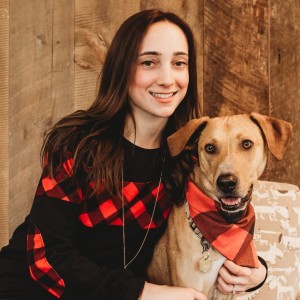
Danielle Vrabel, CPDT-KA
Danielle Vrabel is a dog trainer who earned her CPDT-KA in 2020. Danielle is a proud pet mom of five pets: two dogs, two cats, and a corn snake. Danielle has fostered over ten dogs and fifteen cats and kittens, as well as helped train shelter dogs before they are adopted. Both of Danielle’s dogs are pet therapy dogs, where she also volunteers her time helping evaluate future therapy dogs.
Related articles
Why Does My Dog Keep Shaking Their Head?
They can’t be saying no that much.
![Dog barking]()
How to Stop Your Dog From Barking
The top five reasons dogs bark—and how to get them to relax a bit.
How to Manage Leash Reactivity in Your Dog
If your pup acts diabolical on walks, you are not alone. Here’s what you can do.
Can Your Dog Get Jealous?
Turns out, they can experience pretty complex emotions.
Is Your Dog a People Pleaser?
Yes — and no. Here’s why positive-reinforcement training matters.
![A beautiful trained cute puppy obediently obeys the commands of its female owner at home.]()
5 Important Puppy Behavioral Milestones to Keep Track Of
Your little cutie is growing up in many ways—look out for these big stages as they do.
![Border Collie dog peering behind white fence]()
Why Does My Dog Bark at the Mail Carrier?
How to get your pup and the mail carrier to be friends.
![A red haired woman dog trainer kneeling in front of a Shepherd mixed breed dog with one finger raised that the dog is looking at in an outdoor training course.]()
Understanding Popular Dog Training Methods
Look behind the advertising language when picking a dog trainer.
![Boston terrier being stubborn]()
Dog Training — DIY or Hire a Pro?
When it’s time to call in reinforcements.
![puppy jumping up on crate]()
Gimme Shelter: The Best Dog Crates
Spend less time searching for your dog’s house than you do on Zillow.

